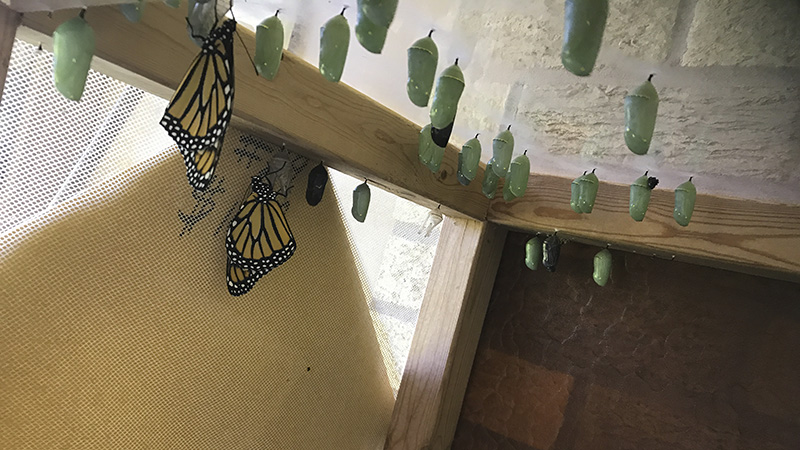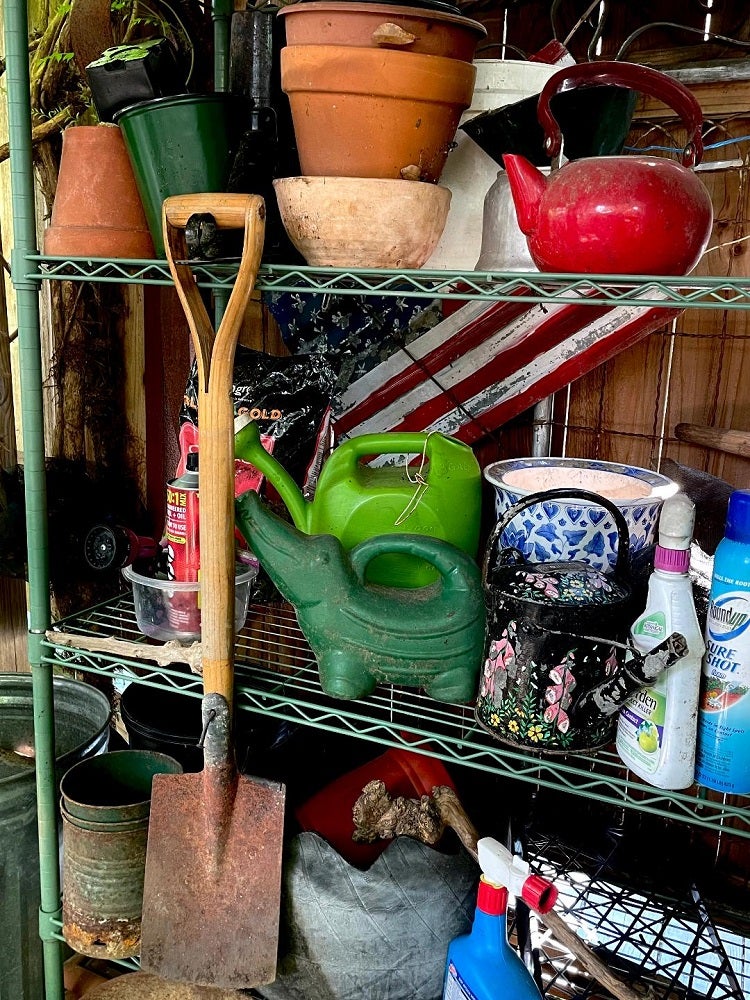A field of dreams for Monarch butterflies
Published 7:00 am Wednesday, May 3, 2017

- Monarch butterfly chrysalises and monarch butterflies in the enclosure, being "cultivated" by retired teacher Kay Williams. Photo by Pat Drackett
By Patricia R. Drackett
Pat is the director of the Crosby Arboreteum and assistant extension professor of landscape architecture with the Mississippi State University Extension Service.
Because last week’s column was about native Mississippi milkweeds, it’s only fitting that this one provides information about monarch butterflies.
Milkweed is the host plant for monarch butterflies. You would have to be a hermit to have not seen the many gardening magazines and websites that urge gardeners to include this perennial plant in their yards in the hope of boosting this insect’s declining population numbers.
There have been, and still are, many community projects in coastal Mississippi – reflecting a recent nationwide trend – to plant “milkweed for monarchs”. The plant also attracts other pollinating insects, so growing milkweed is beneficial for native bees, which are experiencing sharp declines in their numbers as well.
Last week, I had an enchanting visit to Magnolia, Mississippi, and the property of retired teacher Kay Williams, arranged by Pearl River County Master Gardener Amy Nichols. Kay and her husband Michael have a field containing Asclepias viridis, known as green antelopehorn milkweed or spider milkweed. It is abundant in spring along roadsides and pastures, and attracts the monarch butterflies returning from their winter roosting sites in central Mexico.
Green spider milkweed is native to the southcentral and southeastern U.S. To see counties in Mississippi where it has been reported, enter its common or Latin name, along with “USDA” in an Internet search field for a map that you can zoom in on to see county-level data.
When Kay’s fields are cut for hay, seed from their milkweed is spread to other fields in the county. Along with her milkweed seed increasing in range, her passion for raising monarch caterpillars has spread to other persons who live in Pike County.
Area schools and families are spreading the word, and caterpillars, including Kay’s daughter, who teaches gifted classes at Lizana and Lyman Elementary in the Harrison County School District.
Kay’s “butterfly farm” consists of several screened enclosures, containing monarchs at all stages. She hunts for the tiny eggs laid by the butterflies on the leaves of the plants in the field. Monarch butterflies lays one egg at a time, and can lay as many as 500! Only about five percent of the eggs will survive to become an adult butterfly.
Kay cuts the stems, which she brings back and places in water in the enclosures. She will move the smaller caterpillars to other containers, because they can be eaten by the larger ones.
Dozens upon dozens of the green, gold-studded chrysalises hang from the ceiling of the enclosure. While we were there, three monarchs emerged, and these bright orange jewels dashed across the green lawn, drying their new wings. Kay pointed out that when monarch butterflies lay their eggs and approach the end of their lives, their wing color noticeably fades.
It was incredible to drive through Kay’s “field of dreams” and see such large numbers of this native milkweed. She has perfected the technique of precisely digging the plant, and generously popped up some plants for the Crosby Arboretum pollinator garden. This milkweed has a large tuber resembling a sweet potato.
Kay also packed a “go container” of monarch caterpillars to take back, which are sitting on my desk as I write, along with a healthy amount of pre-packed leaves. She regularly distributes such “all-in-one” packages to area teachers.
Use care when handling milkweed. The sap is toxic. Wash your hands thoroughly after handling the plant, and be careful not to transfer the sap onto your face, as juice wiped into the eyes can cause pain and temporary blindness.
If the subject of monarchs and milkweed interests you, visit the Mississippi Milkweeds Facebook page, recently launched to promote the public exchange of information about our state’s native milkweed species.
On Saturday, May 6, children will enjoy a Mother’s Day Paint-a-Pot workshop, painting a planting a terra cotta pot. It’s a perfect gift for moms who love plants! Members’ children $4; nonmembers’ children $5.
For more information, see www.crosbyarboretum.msstate.edu. Call 601-799-2311 to sign up for programs. The Arboretum is located in Picayune, I-59 Exit 4, at 370 Ridge Road (south of Walmart and adjacent to I-59).



